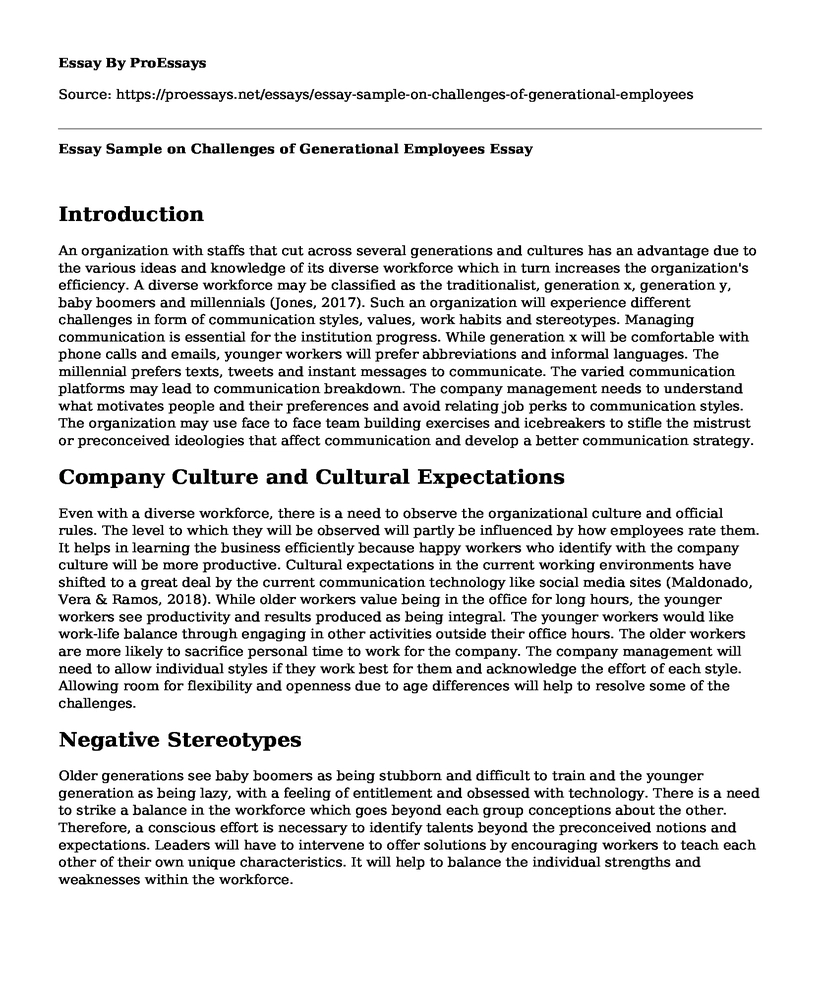Introduction
An organization with staffs that cut across several generations and cultures has an advantage due to the various ideas and knowledge of its diverse workforce which in turn increases the organization's efficiency. A diverse workforce may be classified as the traditionalist, generation x, generation y, baby boomers and millennials (Jones, 2017). Such an organization will experience different challenges in form of communication styles, values, work habits and stereotypes. Managing communication is essential for the institution progress. While generation x will be comfortable with phone calls and emails, younger workers will prefer abbreviations and informal languages. The millennial prefers texts, tweets and instant messages to communicate. The varied communication platforms may lead to communication breakdown. The company management needs to understand what motivates people and their preferences and avoid relating job perks to communication styles. The organization may use face to face team building exercises and icebreakers to stifle the mistrust or preconceived ideologies that affect communication and develop a better communication strategy.
Company Culture and Cultural Expectations
Even with a diverse workforce, there is a need to observe the organizational culture and official rules. The level to which they will be observed will partly be influenced by how employees rate them. It helps in learning the business efficiently because happy workers who identify with the company culture will be more productive. Cultural expectations in the current working environments have shifted to a great deal by the current communication technology like social media sites (Maldonado, Vera & Ramos, 2018). While older workers value being in the office for long hours, the younger workers see productivity and results produced as being integral. The younger workers would like work-life balance through engaging in other activities outside their office hours. The older workers are more likely to sacrifice personal time to work for the company. The company management will need to allow individual styles if they work best for them and acknowledge the effort of each style. Allowing room for flexibility and openness due to age differences will help to resolve some of the challenges.
Negative Stereotypes
Older generations see baby boomers as being stubborn and difficult to train and the younger generation as being lazy, with a feeling of entitlement and obsessed with technology. There is a need to strike a balance in the workforce which goes beyond each group conceptions about the other. Therefore, a conscious effort is necessary to identify talents beyond the preconceived notions and expectations. Leaders will have to intervene to offer solutions by encouraging workers to teach each other of their own unique characteristics. It will help to balance the individual strengths and weaknesses within the workforce.
Culture and Communication
They cause conflict and disorder since language is not uniform. Various people have different communication styles based on their cultural upbringing and also different dialect and word meaning. Language use is influenced by education, social economic and historical situations of individuals or communities (Malek & Jaguli, 2018). Cultural diversity affects the narrations and conversations, thus having an impact on the direction of flow of the communication since each culture has its own ranking of different aspects of life like sporting and entertainment activities. Judging another culture based on preconceptions within the values and standards of one's own culture poses a critical challenge to the organization.
Culture and Work Attitude
There is a need for the employer when sourcing for the employee to go beyond academic achievements and seek to understand the culture of the last organization the employee was working for. It will help to improve teamwork since there will be aware of the existing difference in the culture of the organization. The employer will need to spend time listening and observing employees understand their cultural orientations, preferences, and values. The efforts will help in building teams, organization leadership and conflict resolutions and avert dangers of nepotism in hiring, employees treatment based on age and rudeness of employees.
Cultural Attitudes towards Authority, Decision-making and Cultural Norms
Culture influences the confidence with which staffs assume leadership responsibility and how they navigate the challenges. Cultural orientation is reflected in how the leader supports the team to accomplish their tasks, strategies put in place to assure staffs of their work security and promotion, and collaborative working environment (Fadhul, 2017). Decision making among people from the same culture is more likely to be similar in an organization due to their cultural orientation and, therefore, pose challenges in workflow due to the existence of cross-cultural differences. Cultural differences make staffs to apply cultural knowledge based on the situations. Cultural norms in an organization hinder the level of communication and building multicultural teams due to negative prejudices about certain norms. It affects professional etiquette and communication, lead to conflict in work styles and adapting to the legal requirements.
Reference
Fadhul, S. M. (2017). The relationship between multicultural teams and project performance: evidence from GCC (Doctoral dissertation, Brunel University London).
Jones, L. M. (2017). Strategies for Retaining a Multigenerational Workforce.
Maldonado, T., Vera, D., & Ramos, N. (2018). How humble is your company culture? And, why does it matter?. Business Horizons, 61(5), 745-753.
Malek, M. M. A., & Jaguli, A. R. (2018). Generational differences in workplace communication. Journal of Asian Pacific Communication, 28(1), 129-150.
Cite this page
Essay Sample on Challenges of Generational Employees. (2022, Oct 19). Retrieved from https://proessays.net/essays/essay-sample-on-challenges-of-generational-employees
If you are the original author of this essay and no longer wish to have it published on the ProEssays website, please click below to request its removal:
- The Interview Questionnaire Example
- Essay on Introducing a New Service to Amazon Inc.
- Paper Example on Brainstorming Technique
- The Story Behind Each Cup of Coffee Essay Example
- Cultural Adaption: Essential for Leadership in Global Contexts - Essay Sample
- Essay on Financial Risk Management Failures at Colleges & Universities
- Essay Sample on Successful Leadership Techniques for Business Management







